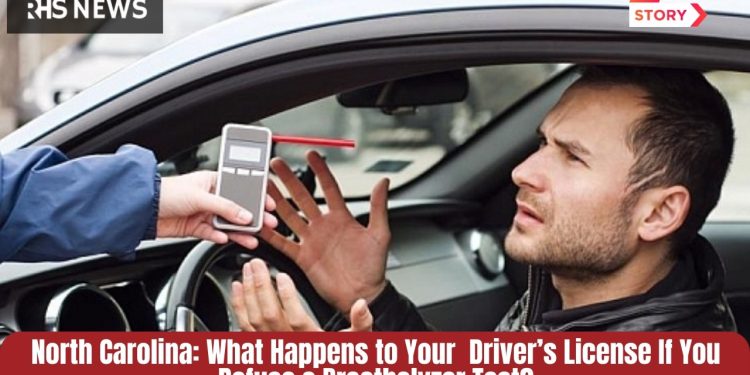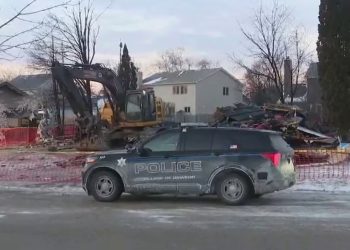North Carolina: The flash of blue and red lights in your rearview mirror is a sight that can make any driver’s heart pound. Whether you’re driving home late from a dinner in downtown Raleigh or heading back from a brewery in Asheville, a traffic stop can be a stressful experience. If the officer suspects you’ve been drinking, the situation can escalate quickly. You may be asked to step out of your car, perform field sobriety tests, and then face a critical decision: should you submit to a breathalyzer test?
Many people mistakenly believe that refusing the breathalyzer is a simple way to avoid a Driving While Impaired (DWI) charge. The logic seems simple: no breath sample, no evidence of your blood alcohol concentration (BAC), no case. Unfortunately, in North Carolina, the reality is far more complicated and carries its own severe set of consequences, particularly for your driver’s license.
This article will provide a comprehensive guide to what happens when you refuse a breathalyzer in North Carolina, exploring the legal framework, the immediate and long-term penalties, and how a refusal impacts both your driving privileges and your potential criminal case.
The Foundation of the Law: North Carolina’s Implied Consent
To understand the consequences of a refusal, you must first understand the principle of “implied consent.” Under North Carolina General Statute § 20-16.2, if you are lawfully arrested by an officer who has probable cause to believe you have committed an alcohol-related driving offense, you have automatically, or “impliedly,” consented to a chemical analysis of your breath or blood.
Think of it this way: the State of North Carolina considers driving on its public roads a privilege, not an inherent right. As a condition of receiving and holding that privilege, you agree to cooperate with law enforcement in determining your sobriety if you are suspected of impaired driving. You are informed of these rights—both the right to refuse and the consequences of that refusal—by the officer, typically by reading a form outlining your rights before the official test is administered.
When you refuse the test, you are withdrawing that consent, and the state imposes specific, non-criminal penalties for that withdrawal, completely separate from any DWI charge you may be facing.
Not All Tests Are Created Equal: Roadside vs. Evidentiary Breathalyzers
A common point of confusion is the difference between the two types of breath tests you might encounter during a DWI stop. Understanding this distinction is crucial, as the consequences for refusal differ significantly.
The Portable Breath Test (PBT) at the Roadside
This is the small, handheld device the officer may ask you to blow into at the scene of the traffic stop, perhaps on the side of I-40 near Greensboro or on a quiet street in a Charlotte suburb. The purpose of the PBT is not to provide definitive evidence of your BAC for court. Instead, its results are used to help the officer establish probable cause for a DWI arrest.
In North Carolina, you can legally refuse to take this roadside PBT without the direct penalty of losing your license for the refusal itself. However, this refusal can still be used against you. The officer can testify in court that you refused the preliminary test, and a prosecutor may argue that this refusal indicates a “consciousness of guilt”—that you knew you were intoxicated and were trying to hide it. Furthermore, the officer can still arrest you for DWI based on other evidence, such as the smell of alcohol, slurred speech, poor performance on field sobriety tests, or an admission to drinking.
The Evidentiary Test at the Station (Intoxilyzer)
This is the test that truly matters for implied consent purposes. After you have been arrested and transported to a police station, detention center, or mobile testing unit, you will be asked to submit to an evidentiary chemical analysis. In North Carolina, this is most often a sophisticated breath testing machine like the Intoxilyzer 9000. The results of this test are admissible as evidence in court to prove your BAC.
This is the test that triggers the severe license revocation penalties under the implied consent law. Refusing to provide a sufficient breath sample for this machine is considered a “willful refusal,” and the consequences begin immediately.
The Immediate Consequence: The 30-Day Civil Revocation
The moment you willfully refuse the evidentiary breath test, the arresting officer is authorized to take your driver’s license on the spot. They will then issue you a “Notice of Civil Revocation.” This is often a pink form that serves as both a receipt for your license and an official notice that your driving privilege is being revoked.
This initial revocation lasts for 30 days. This is an administrative penalty imposed by the North Carolina Division of Motor Vehicles (DMV), not a criminal penalty from a judge. For the first 10 days of this revocation, you are not legally allowed to drive for any reason.
After the 10th day, you may be eligible to petition the court for a Limited Driving Privilege (LDP). This LDP typically allows you to drive for essential purposes, such as to and from work, for household maintenance (like grocery shopping), for medical appointments, or to attend school. Obtaining this privilege requires filing a petition with the court and paying a fee, currently 100.
The Long-Term Penalty: The One-Year Willful Refusal Revocation
The 30-day civil revocation is only the beginning. The arresting officer will also submit a sworn affidavit to the DMV detailing your willful refusal. Upon receiving this report, the DMV will mail you a notice that your license will be revoked for an additional one full year.
This one-year revocation is separate from and in addition to the initial 30-day revocation. It is also completely independent of the outcome of your criminal DWI case.
- If you are found not guilty of DWI, you will still lose your license for one year for the refusal.
- If your DWI charge is dismissed, you will still lose your license for one year for the refusal.
This is the most misunderstood aspect of a refusal. Many drivers think that if they “beat” the DWI case, they will automatically get their license back. This is incorrect. The refusal revocation is a penalty for breaking the “implied consent” agreement with the state, not for being guilty of impaired driving.
Can You Fight the One-Year Refusal Revocation?
Yes, you have the right to challenge the one-year refusal revocation, but the window to act is extremely narrow. You must request a hearing with the DMV within 10 days of your arrest. Failure to meet this deadline typically results in a waiver of your right to a hearing.
The DMV hearing is not a trial to determine your guilt or innocence on the DWI charge. It is a limited administrative proceeding to determine if the officer and the DMV followed the correct procedure. The hearing officer will only consider four specific issues:
- Were you charged with an “implied-consent offense” (like a DWI)?
- Was the officer’s belief that you committed the offense based on probable cause?
- Were you properly notified of your rights regarding the breathalyzer test?
- Did you willfully refuse to submit to the chemical analysis?
Your attorney can challenge the revocation on these grounds. For example, they might argue that the officer lacked probable cause for the initial arrest, that you were not properly read your rights, or that your failure to provide a sample was not “willful” (e.g., due to a medical condition like asthma that prevented you from giving a sufficient sample). If you win this hearing, the one-year revocation will be rescinded. If you lose, the one-year revocation stands.
How Does a Refusal Impact Your Criminal DWI Case?
While refusing the breathalyzer creates a definite problem for your driver’s license, its effect on your criminal DWI case is a double-edged sword.
The Potential Advantage
The primary advantage is that the prosecutor lacks the single most powerful piece of evidence in a DWI case: a BAC reading over the legal limit of .08. A numerical BAC value is often seen by juries as concrete, scientific proof of impairment. Without it, the prosecutor must build their case on more subjective evidence, such as:
- The officer’s observations of your driving pattern.
- Your physical appearance (red eyes, fumbled wallet).
- Your performance on field sobriety tests.
- Any incriminating statements you made.
A skilled DWI defense attorney can often effectively challenge this type of subjective evidence in court, creating reasonable doubt for a jury.
The Significant Disadvantage
The major disadvantage is that your refusal does not happen in a vacuum. North Carolina law explicitly allows the prosecutor to introduce the fact of your refusal as evidence against you in your DWI trial. The judge will instruct the jury that they can consider your refusal as evidence of your “consciousness of guilt.”
The prosecutor will argue that an innocent person with nothing to hide would have gladly taken the test to prove their sobriety. They will paint a picture of you refusing the test because you knew you were intoxicated and would fail it. This can be a very persuasive argument for a jury, sometimes just as powerful as a high BAC reading. From Wake County to Buncombe County, prosecutors across the state use this tactic effectively every single day.
Special Considerations for CDL Holders
For commercial drivers, the stakes of a refusal are drastically higher. Under both state and federal law, a willful refusal to submit to a chemical analysis while operating any vehicle (commercial or private) will result in a one-year disqualification of your Commercial Driver’s License (CDL) for a first offense. A second refusal will result in a lifetime disqualification. There is no limited driving privilege available for a commercial vehicle. This consequence alone can be career-ending for a professional driver.
Conclusion: A Complex Decision with Serious Consequences
The decision to refuse a breathalyzer test in North Carolina is not a “get out of jail free” card. It is a complex legal choice that trades one set of problems for another. While you may deprive the prosecution of a key piece of scientific evidence for the criminal DWI charge, you simultaneously trigger a guaranteed, immediate, and lengthy revocation of your driver’s license by the DMV.
In a state with sprawling cities like Charlotte and a vast network of rural roads, losing your driving privilege for over a year is a devastating penalty that can affect your job, your family, and your quality of life. The legal landscape surrounding DWI and implied consent is intricate and unforgiving.
If you are facing this situation, the most critical step you can take is to contact a qualified and experienced North Carolina DWI defense attorney immediately. They can help you navigate both the DMV license revocation process and the criminal court proceedings, ensuring your rights are protected and helping you work toward the best possible outcome in a challenging and stressful situation.










